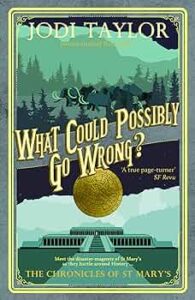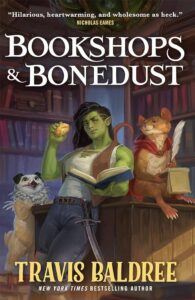Tables are turning, and characters are leveling up. In the sixth book of the Chronicles of St Mary’s — a mostly lighthearted and adventurous series about time-traveling historians — Dr Madeleine Maxwell has been promoted to Chief Training Officer. True to form, she’s shaking things up. In this case, she’s speeding up the training of new historians by including time jumps from an early stage, instead of waiting until the end of training when the departure of a historian from the program would cost St Mary’s the loss of a significant investment. Of course that cuts both ways: the trainees will be exposed to the dangers of the past without the full repertoire of skills that they’re expected to gain through training. Max’s solution is to bring along extra supervision from both the security and history departments.
And while you can put Max into a position of responsibility, you can’t quite make her responsible. During the first session, one of the trainees asks whether historians make time jumps alone.
“No. We very, very rarely initiate solo jumps,” and remembered not to say that that was usually because we needed someone to bring the body home. Too early in the schedule for historian humour.
I paused but there were no more questions.
“A special note for the ladies. You will be required to learn to ride sidesaddle. See Mr Strong for a schedule.”
I paused, struggled, and then completely failed to resist temptation. You can only channel a certain amount of goodness in one day.
“I recommend old Turk as your horse. I did my own training on him and he knows his business.” Which was perfectly true. It’s just that his business was dumping any rider into the nearest bramble bush and then pushing off, leaving them to do the walk of shame back to St Mary’s. He was lean, mean, and carnivorous. An unfortunate encounter with Mr Markham some years ago had soured his already evil disposition. Markham, on fire at the time and understandably having other things on his mind, had run full tilt into Turk’s bottom, and knocked himself unconscious. (p. 27)
It’s not immediately obvious, but that exchange marks the start of one of the most important aspects of What Could Possibly Go Wrong. History is a serious business; experiencing it live and in person doubly so. Why do the staff of St Mary’s seem sometimes to run the gamut from peculiar to silly, without once stopping in on earnest or sober? Not long before the trainees’ first jump — Max has compressed months of training into just over seven weeks — a very serious question crops up. Some time back, the historians had a mission to St Paul’s during the Blitz, only their enemies were already there and lying in ambush. St Mary’s took casualties, and the whole thing escalated so as to nearly put an end to the Institute. How had the enemies known exactly where and when to be?










